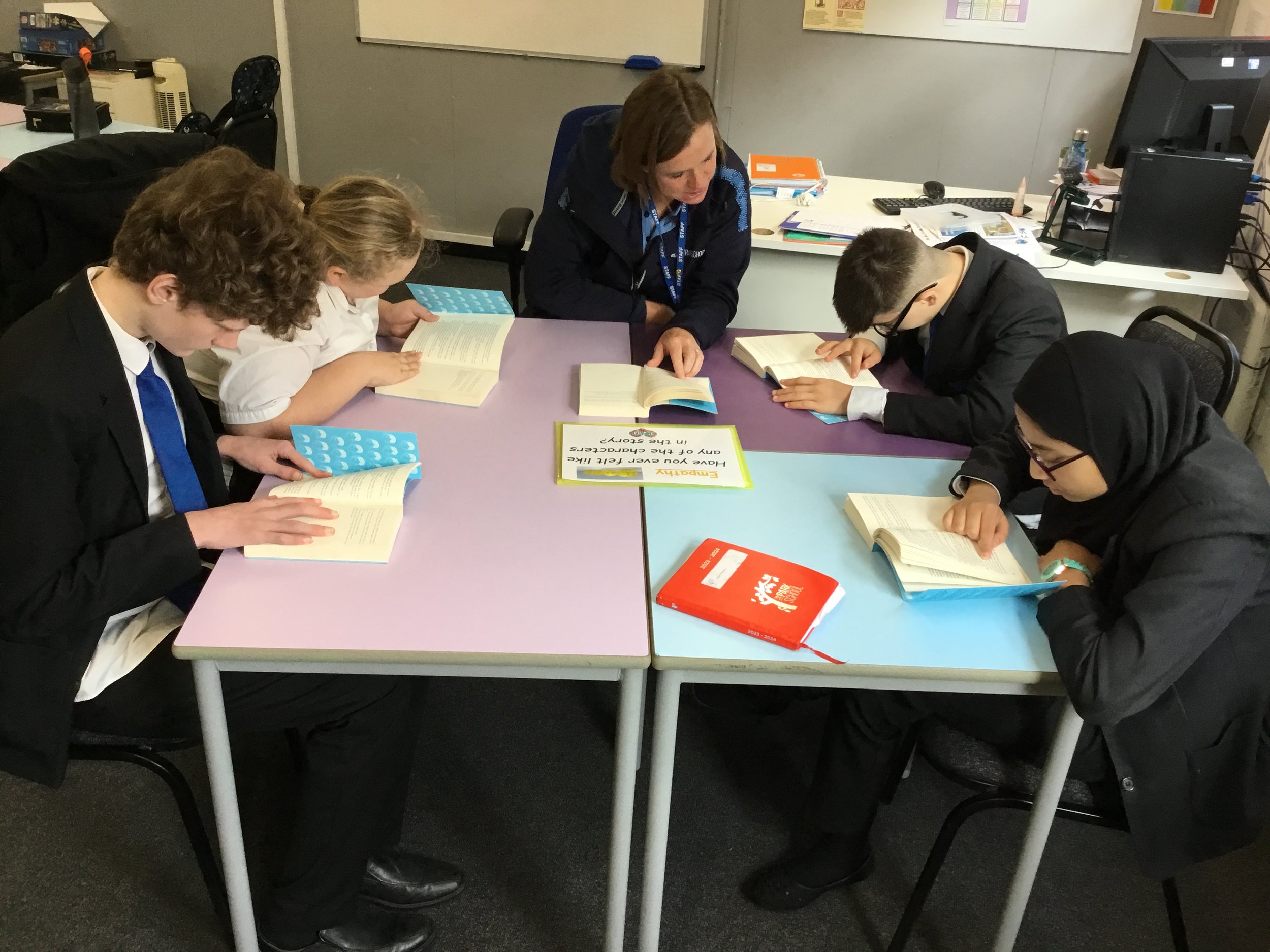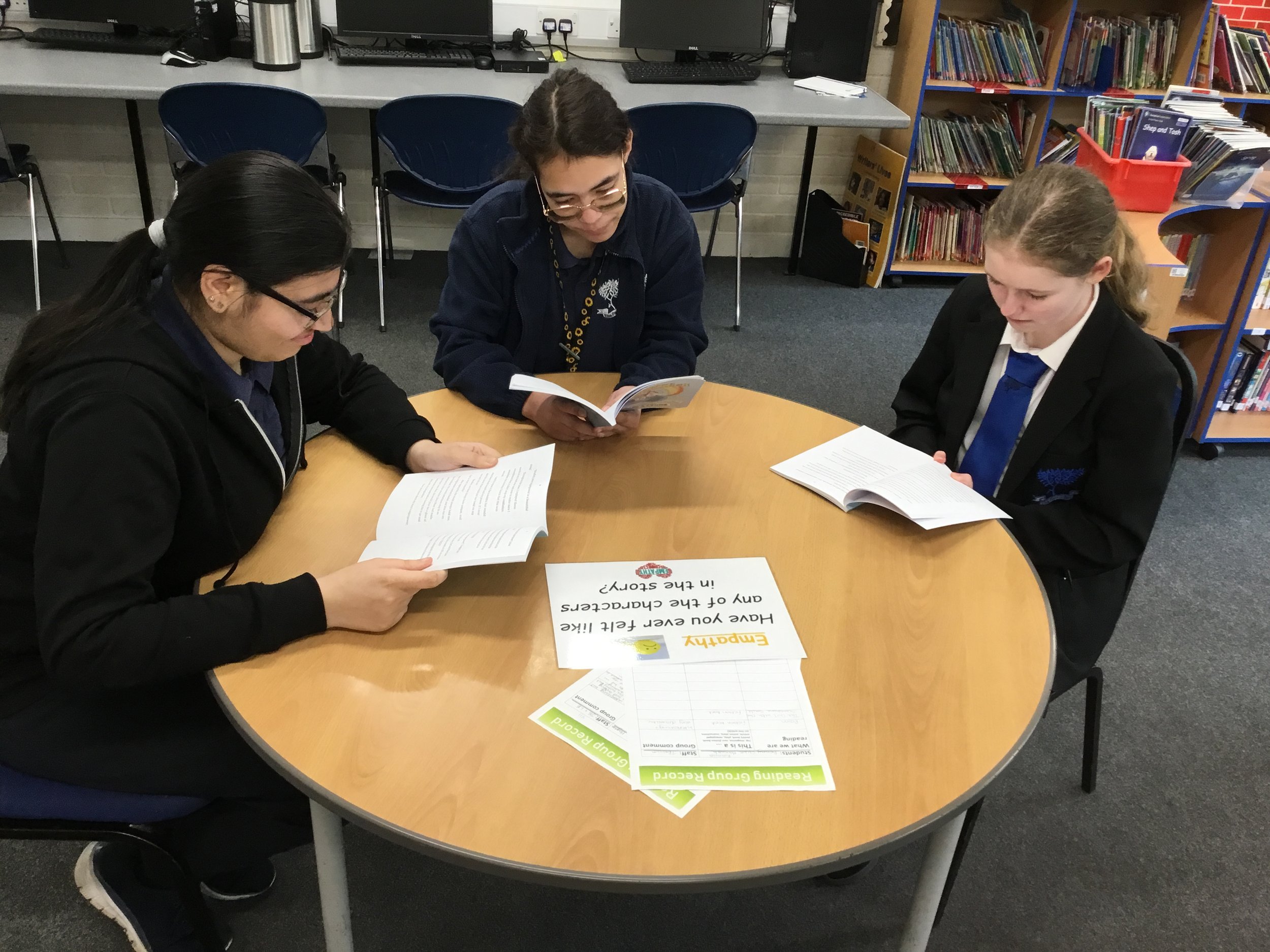Reading
Reading is a fundamental life skill;
a passport to success.
We learn to read, so that we can read to learn.
At The Park School, reading is an integral part of our school day. We celebrate reading anytime, any place, anywhere and foster a reading for pleasure culture. We believe that all of our students can learn to read and aim to inspire and ignite a passion for reading in everyone. Through a whole school, consistent approach, we teach our students to learn to read, so that they can read to learn. This helps them to develop independence and success for lifelong learning.
All of our staff read with the students every day. We aim to foster a love of reading, in all it’s forms, at whatever level the students can access it. We start from where they are, and take them on a journey to success, inspiring and supporting them to see themselves as readers for now and in the future.
Phonics and the Alphabetic Code
“Phonics is a highly effective method of teaching word reading. Almost all children who receive high-quality phonics teaching will learn the skills they need to tackle new words. They can then go on to read any kind of text fluently and confidently, and to read for enjoyment.” (DfE 2023)
Our students arrive at The Park School having differing levels of understanding of phonics and the alphabetic code. We assess all students in year 7 and create an individual pathway of learning phonics for each student, according to their needs.
We encourage students to be detectives and see the English language as a code that we need to work out to be able to read accurately and fluently. At The Park School, we follow the national curriculum framework for teaching phonics (letters and sounds) , using a systematic approach. We use elements of the Read Write Inc programme to create a curriculum that is suitable for the needs and age of our learners. We supplement this with our own games and resources to ensure we maintain excitement and enthusiasm for learning. Students are assessed regularly and an individual focus for each student ensures that they make the maximum progress with the ability to decode unfamiliar words eventually leading to automaticity in reading. For students with a higher level of understanding of phonics, a higher level of phonics is taught, eg working with morphemes and syllables and being able to manipulate these to help them read more complex words.
“Tricky words” (those that are not decodable) are taught as whole words and students are encouraged to use visuals, look for patterns and shapes, use songs and rhymes, physical movement and other multisensory approaches to help them memorise them
Language and Comprehension
“Comprehension does not refer to reading itself but, rather, to the way in whichwe make sense of words, sentences and the wider language we hear or read…
Children need both good language comprehension and good word reading to become good readers.” (The Reading Framework 2023)
At The Park school, we recognise the importance of developing language and comprehension skills alongside teaching decoding skills in learning to read. Exposure to a rich variety of language is essential for our students to understand what they are reading. We do this through all of our lessons across the curriculum; learning through talking, conversations, discussion and debate and through specific teaching of higher level language.
We ensure that students listen to and discuss books and reading material to help them to expand their vocabulary and extend their understanding of language to enable themto become fluent readers. Through talking about books our students learn how they arestructured, how a plot unravels, why authors choose the language they use, how we can “read between the lines” and infer, how exciting reading can be, how they can relate to it, how it can transport them to another world and how they can make connections with themselves and the world around them.
We work closely with the speech and language team and all staff are aware of students’ levels of language understanding. Whilst reading with students, staff therefore ask carefully structured questions appropriate to the students’ level to help develop their language, comprehension and inference skills in their reading.
Individual Reading and Reading at Home
“The single biggest way to support children academically and emotionally at home is to encourage them to read.” (Badger Learning 2024)
Our partnership with families at home is essential to support our students with their reading. We work together to encourage all students to read at home as much as possible. For those students who are reluctant to read a book we encourage them to read whatever they prefer at home - instructions, recipes, websites, cereal packets, magazines - anything that inspires them! We encourage families to read to each other, listen to audio books and talk about reading to help develop a love of reading. We celebrate all reading and encourage students and families to share it with us to help develop reading skills even further.
All students are regularly assessed in their reading skills. This helps to set them on the right pathway to develop their reading skills. They are guided to choose a book from our extensive library and take it home to read. Students will always have a book with them and can take home a range of books from our colour coding and number system, which will have a specific focus eg to help them decode words, comprehension, inference, expression or for family to read to them to develop enjoyment, understanding and expose them to a rich vocabulary. All of our individual reading books are chosen to appeal to our students with many of a high interest, low reading age as well as several that are specifically dyslexia friendly. Some books, specifically for our older students, are also available in the KS4 classrooms.
To help families support their child with reading at home, we have a coded system which shows parents what to focus on with the book that their child has chosen.
Year 7 and 8 have a specific reading diary where parents can write comments and share their child’s progress with us and Years 9-11 have their school diaries.
To find further information on how to support your child at home, please follow this link:
Group Reading
We start the day with a reading activity every morning. Students listen to stories or take part in a group reading session within a small group, matched to their ability. We have a range of group reading books including fiction, non-fiction, plays and poetry which students choose as a group. Each week the group has a different focus. Students and staff read aloud a range of different texts, talk about what they have read, discuss language, show understanding, make inferences and practice intonation and expression. For those at a very early stage of literacy, students will work on their phonic skills as well as enjoying the story. This helps to develop enjoyment in reading and extend the students’ reading miles. Students are exposed to high quality texts which are age appropriate, whilst at the same time, suitable for their reading age. This helps to keep the students engaged and motivated for reading, developing self-confidence as readers.
Reading in English Lessons
Students have four English lessons each week. Each lesson has a reading aspect to it with one lesson having a very specific focus on reading and phonics. In KS3, students study a wide range of fiction and non-fiction texts carefully chosen to match their interests, to develop their language, their reading skills and their enjoyment of reading. In KS4 students continue to read a variety of texts and for those students that are ready, they will progress to taking Functional Skills English exams where students complete reading tasks related to practical, functional reading..
Reading Across the Curriculum
Teachers carefully plan their lessons so that students are able to continue developing their reading skills across the curriculum. All staff are aware of each student's reading and phonic level, and plan work accordingly. Presentations and worksheets are carefully created with an appropriate level of language and visuals to help students to feel confident in their reading across all subjects. Teaching assistants help support and encourage students to develop the skills learned in English lessons to apply them across the curriculum, helping them to make connections across their learning, developing confidence in their abilities to read even further.
Interventions
Students that are at a very early literacy level or who are not making progress that we would expect, will be offered literacy interventions to help them to develop their skills in a smaller group or 1:1 lesson. All of these interventions are carefully designed to match individual needs and to ensure that students feel confident and ready to move on to the next stage of their learning. Some students will also take reading books home carefully matched to their intervention work to help reinforce the skills they have been learning.
Above and Beyond in Reading!
To inspire and motivate our students with reading even further, we offer additional reading activities across the school year.
Every Week:
We have a weekly book club at lunchtime where we gather together with a hot chocolate and a cookie in the library and enjoy listening to a variety of new books that are hot off the press!
Every Year:
We offer a reading challenge that students can complete at home to earn points and prizes!
We invite authors into school to talk to the students about their books and inspire them to read and write books.
We celebrate World Book Day with a variety of reading activities throughout the day, including dressing up, scavenger hunts, writing books, listening to authors.












